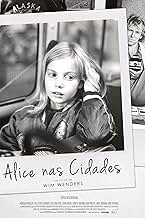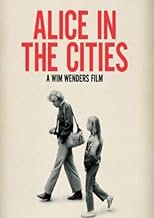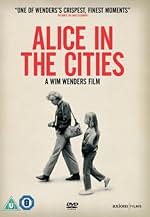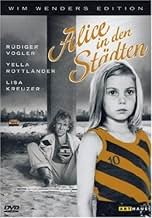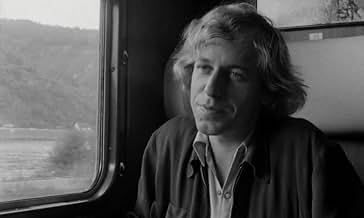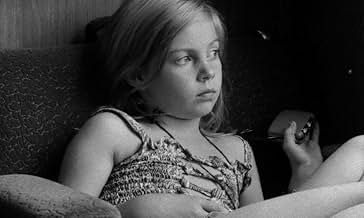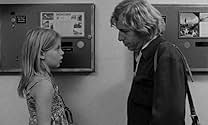Eine deutsche Journalistin wird mit einem neunjährigen Mädchen gesattelt, nachdem sie ihrer Mutter auf einem Flughafen in New York begegnet ist.Eine deutsche Journalistin wird mit einem neunjährigen Mädchen gesattelt, nachdem sie ihrer Mutter auf einem Flughafen in New York begegnet ist.Eine deutsche Journalistin wird mit einem neunjährigen Mädchen gesattelt, nachdem sie ihrer Mutter auf einem Flughafen in New York begegnet ist.
- Regie
- Drehbuch
- Hauptbesetzung
- Auszeichnungen
- 1 Gewinn & 1 Nominierung insgesamt
- Lisa van Damm
- (as Elisabeth Kreuzer)
- Young Girl on Ferry
- (Nicht genannt)
- Chuck Berry
- (Archivfilmmaterial)
- (Nicht genannt)
- Man Looking at Monitor in New York Airport
- (Nicht genannt)
- …
- Man at Chuck Berry concert
- (Nicht genannt)
- Organist at Shea Stadium
- (Nicht genannt)
- Woman Behind Philip and Alice on Plane
- (Nicht genannt)
- Man on Empire State Building Roof
- (Nicht genannt)
Empfohlene Bewertungen
This is the first film of what is regarded as Wim Wenders loosely connected road trilogy, following on from this picture would be Falsche Bewegung in 1975 and then culminating with the quite brilliant Im Lauf der Zeit in 1976. Quite what Wenders intentions were with this picture is is not immediately clear, for certain his framing {obsession} with American culture comes to the fore from the off, both in the changing landscapes and the use of American pop and rock music. But as things progress it's the simple message of purpose that a chance encounter can have, our odd couple here are at first deeply suspicious of each other, not caring for each others company in the slightest, but as time moves on they begin to understand each other and tune into each of their respective mental waves. Life quite simply found a way thru two differing humans thrust together unwillingly, it's not deep or remotely profound, it's simple and warm in its execution, and the final (tremendous) pull away aerial shot that Wenders gives us crowns this accomplished and very enjoyable piece. 7.5/10
Between the years 1971 and 1977, Wim Wenders could do no wrong. Yet, even with his best films already on the screen, mainstream success eluded him until 1984, when his over- romanticized Paris, Texas (a fanboy-esquire ode to John Ford and the American landscape) established him as one of Cannes' most beloved filmmakers. Perhaps as a result of commercial success coming from his sappiest work to date, Wenders' chased a tangent that spiraled into career insignificance after 1993's Faraway, So Close! By the mid-late 90's, Wenders' films (documentaries excluded) became achingly pretentious and ripe for parody.
Back in his prime, 1974's Alice in the Cities / Alice in den Städten foreshadowed the near perfection to come in 1976's Kings of the Road / Im Lauf der Zeit. Overshadowed by KOTR, AITC has been overlooked, yet despite its smaller scale, budget and running time, it addresses many of the same themes common to Wenders' best films. The most prevalent of these recurring themes is: der angst (translated: Fear). All of Wenders characters are driven by a fate defined by either Kierkegaard and/or Heidegger's notion of what fear is. Wenders' Angst is the German equivalent of what Existentialism was to the French New Wave, powerful philosophical themes that would ultimately shape the direction of their respective cinematic movements.
If asked to recommend a series of films every fan of cinema should see, I wouldn't hesitate to suggest the films Wenders made between 71-77 (in addition to 1982's The State of Things / Der Stand der Dinge). In my mind these films are meditative, visually hypnotic and poignant essays that speak volumes on the human condition and of film-making itself. These films have inspired me tremendously and if you're a fan of Jim Jarmusch, discovering these films will feel like uncovering a hidden cache of his films. Jarmusch owes a great debt to Wenders both as an inspiration but also as a donor, since it was the short ends from State of Things that enabled Jarmusch to make his exceptional second feature Stranger Than Paradise. If you haven't already seen these films, make the effort...you will be happy you did: The Goalie's Anxiety at the Penalty Kick /Alice in the Cities / Wrong Move / Kings of the Road / The American Friend.
A silenced bewilderment has already become routine in the completely paralyzed life of a man, who only pities himself, and who apparently has lost all access to his fellow men. Therefore the girlfriend in New York, to whom he wants to unburden all his world-weariness can do nothing for him but show him the door, saying: "Nobody told me how to live either."
So he forgot how to live, our very typical hero of modern times. But just as in a children's story rescue suddenly appears in the shape of a wondrous fairy, Philip Winters also has a surprising encounter, which will help him to determine his position in this world anew. The unexpected enlightening figure is a child, nine-year-old Alice. Her mother, whose acquaintance Philip had somehow forcibly made at the airport counter, has let her down, leaving behind a succinct message, in which she asks Winters to take provisionally charge of the girl until she will follow them to Amsterdam in a later airplane.
The mother does not appear though, and thus Philip Winters does not have any other alternative but to go on looking after the child, a responsibility he most willingly would like to avoid. But Alice remains persistent, she scents the possibility of an exciting adventure. She mentions a grandmother, who possibly lives in Wuppertal, West Germany. Unwillingly Winters bows to his fate, but after a few abortive attempts he simply deposits her at a police station and goes to a Chuck Berry concert on his own.
That could be the end of the story. But as I already mentioned, Alice is a fairy. And so she does not only come back, but also actually succeeds in getting a mechanism going in Philip Winters which seemed to be already dead and buried: the reference to the other one, the preparedness to get involved with his fellow creatures. At the end of the film he seems to be recovered, the train in which he and Alice are sitting, is obviously moving along on newly built tracks, the decisive switching of the points has been made.
At least for the time being. For it is exactly in this hopeful and promising moment that we have to leave this wonderful movie. We are just allowed to throw another brief glance at the protagonist, who is sitting in the compartment joyfully united with Alice, a moment before the camera steps back and rises into the air, moving irresistibly away from the scene, until it depicts a vast panoramic view. But our eyes are still fixed on the train that hastens steadily through the immense landscape heading towards a destiny unknown.
Alice in the Cities marks the first appearance of the director's recurring character Philip Winter (Rüdiger Vogler) who would later reappear in several other Wenders titles. This time he is a journalist and photographer who has been assigned to travel around in the United States and write a story about his experiences but suffers from a bad case of writer's block. Just before returning to his native Germany he meets a German woman called Lisa (Lisa Kreuzer) and her young daughter Alice (Yella Rottländer) who are also planning to return home. Soon Philip finds himself as Alice's temporary custodian and takes her on a long road trip through Germany in order to find her grandmother whose whereabouts seem to be more or less unknown.
Many stories have been made about men learning something new about themselves upon suddenly becoming responsible for a child. The premise can easily be made into a cheesy inspirational family movie, but luckily Alice in the Cities takes a more ambitious, or perhaps ambiguous, route. There are only three significant characters in the story: Philip appears to enjoy living and working alone but gets fairly well along with the young Alice who has also been thrown into the situation against her will but is able to maintain a positive attitude most of the time. The third important figure in the film is Alice's mother Lisa who remains rather enigmatic and does not reveal much about her motives. Philip and Alice do quietly evolve as persons over the course of the story; how exactly, the audience must figure out by themselves.
Visually the movie looks fine. The grainy black and white cinematography is guaranteed Robby Müller quality and the melancholic score is provided by the legendary German krautrock band Can. Numerous shots are filmed through car windows as Philip drives through American or German towns by himself or with Alice, so admirers of urban environments can get a neat first-hand view of a traveler. I especially liked the scenes on or near the suspended monorail in Wuppertal, Germany. Loud TV programs playing in various television sets are also a recurring theme and a source of frustration for Philip, whereas Alice seems to enjoy them more.
There are some things I'm not sure I like, such as the slightly excessive runtime or the frequent fades to black that make many scenes feel a tad rushed, but in the end I enjoyed the movie as a whole. Rüdiger Vogler does a good job as the quiet Philip and Yella Rottländer never comes across as unnatural or annoying in the role of Alice. Alienation, parenthood and traveling are themes that have wide appeal and whilst "the journey is more important than the destination" may not be a wildly original conclusion, it always makes a fitting overhanging theme for a road movie. In addition, Alice in the Cities features a strong thematic connection to Paris, Texas and is recommended viewing to fans of said movie and traveling films in general.
If there are movies, like comedies and horror films, that are better seen in a crowd, there are some movies that might be best seen alone. This is one of them, and I didn't realize until I was almost done because it had become so absorbing I was really enjoying my isolation within the movie.
The plot is simple, and I won't say how it happens, but a nine year old Dutch-German girl is left with a German man in the United States, and he takes care of her as they search for a way to find her mother or grandmother. Their first step is to fly back to Amsterdam, and then in Germany in a little car they poke around looking for her home.
It's a road movie, though unlike any other. The two main characters are about as perfect and as natural as it gets. The man is a thoughtful, drifting writer and photographer, an artist in the counter-culture way of the times. He has no real ambition, but observes the world with poetic appreciation. So when this girl is made part of his life, he takes it in stride. That's key to the mood of the film, that this very unlikely situation can continue for so long because he just goes with the flow. There is no running to the police, no panic. But there is no sense either that this is an accepted new relationship. It's for the moment, but the end of the moment is continually deferred.
The girl goes with the flow as well, and is as brilliant as the man at being natural in front of the camera, often doing nothing. She's made to be lovable, of course, but not in any coy or sentimental way. (If this were a Hollywood film we'd all be barfing by now.) All of this matters because it isn't what's happening that really matters, but it's just being together, the two of them, and then (you realize) the three of you. You wish it was you who was doing this utterly humane, deeply felt act of traveling and being supportive and seeing modern (1973) Germany.
The filming is simple black and white but brilliantly effective, down to the heart wrenching last shot (which was probably the most expensive). The setting is actually a surprise in that you never think of the ordinary middle class and industrial parts of middle Europe being so interesting. The music comes and goes, and refers to the earthy music of the time, mostly American blues based stuff.
In a little way this reminded me of "Stranger than Paradise" and when I connected the two I saw how much Jarmusch (in that film) owed to these art film experiments just a few years earlier. And now that I think of it, this one is more touching and important even if "Stranger than Paradise" is more inventive. "Alice in the Cities" makes a case for a kind of film we don't see being made now, and which might have another vogue one of these years in reaction to the general highly refined, highly artificial worlds of most movies today. I hope so.
Wusstest du schon
- WissenswertesThe novel "Tender is the Night" by F. Scott Fitzgerald is seen on the coffee table of Phil Winter's girlfriend. A character in the novel, Rosemary Hoyt, was inspired by Fitzgerald's affair with actress Lois Moran, who appears in this film as an airport hostess. It was Moran's last movie.
- PatzerCrew are reflected in the side of the car (at around 46 mins - sound man, microphone and other crew. This is why so many cars in movies appear dirty or have a matte paint job.).
- Zitate
Lisa - Alice's Mother: What are you writing?
Philip 'Phil' Winter: The inhuman thing about American TV is not so much that they hack everything up with commercials, though that's bad enough, but in the end all programmes become commercials. Commercials for the status quo. Every image radiates the same disgusting and nauseated message. A kind of boastful contempt. Not one image leaves you in peace, they all want something from you.
- VerbindungenFeatured in Mia toso makryni apousia (1985)
- SoundtracksUnder the Boardwalk
Written by Kenny Young and Arthur Resnick
Performed by The Drifters and The Rolling Stones
Top-Auswahl
- How long is Alice in the Cities?Powered by Alexa
Details
- Erscheinungsdatum
- Herkunftsland
- Sprachen
- Auch bekannt als
- Alice in the Cities
- Drehorte
- Produktionsfirmen
- Weitere beteiligte Unternehmen bei IMDbPro anzeigen
Box Office
- Budget
- 500.000 DM (geschätzt)
- Weltweiter Bruttoertrag
- 59.294 $
- Laufzeit1 Stunde 53 Minuten
- Farbe
- Sound-Mix


